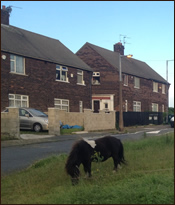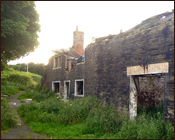A Walk in Bradford
 There is a path that runs in parallel to the playing fields of St. Clare’s Catholic School in Fagley, Bradford. Along its sides grow thistles and nettles and every type of suburban wild flower. Walk down from the path’s entrance on Moorside Road, avoid the prickles and stinging leaves, and ignore the bark of loud, alarmed dogs from neighbouring yards. At the end, lay one the quietest neighbourhoods in Bradford. I strolled down this way on Wednesday evening.
There is a path that runs in parallel to the playing fields of St. Clare’s Catholic School in Fagley, Bradford. Along its sides grow thistles and nettles and every type of suburban wild flower. Walk down from the path’s entrance on Moorside Road, avoid the prickles and stinging leaves, and ignore the bark of loud, alarmed dogs from neighbouring yards. At the end, lay one the quietest neighbourhoods in Bradford. I strolled down this way on Wednesday evening.
If there is a part of Britain that feels more removed from the thoughts of leaders and luminaries, I have yet to find it: even the open countryside has English Heritage and others to speak on its behalf. There lies a set of former social housing homes, likely long since surrendered up to a Buy to Let scheme. Some of the houses had tidy yards, others were in a state of advanced disrepair: in front of one home made of crumbling brown brick was a patch of ground that bore nothing but overgrown grass and a rusty trampoline. Crushed cans of Carling Black Label littered parts of the pavement.
There is a small green in the middle of this neighbourhood: the carpet of grass was heavily pockmarked with weeds, nevertheless, a small dark brown pony with a contrasting splodge of white on its back crunched happily on the greenery. The pony’s dilapidated cart was set to one side. I assumed that this was the vehicle for our local scrap merchant whom I sometimes see doing the rounds in my neighbourhood.
Further along, there was a house with a dented yellow skip in its driveway. My other half and I spotted a boy with curly blonde hair; he was probably about six years old, had a bright blue dummy in his mouth and wore a blue cardigan with holes in the sleeves. My other half thought it was curious that such a small child should be out for a walk on his own. Nevertheless, he strode with confidence. He pushed on a gate in front of one of the houses; ah, we reasoned, he was going home. Then he emerged again, dummy still in his mouth. As we got closer, we saw his face was streaked with dirt. He was carrying a hammer which was so large he needed to hold it in both hands. Why? We didn’t wait to find out. The little boy cheerfully said “Hello” to us, and we replied in kind. His young sister, dressed in a dirty pink dress, was standing in the driveway looking on.
By that time, it was about seven o’clock. The sun was still up, and the air was pleasantly cool. There were no sounds of televisions or radios, no idle chatter floating from open windows. I didn’t detect any scent of cooking. Amidst the crooked satellite dishes pointing up at the clear sky and the crushed Cheese and Onion crisp packets strewn on the broken pavement there seemed to be little happening. Perhaps activity was confined to weekends or after dark. I wondered if the children went to St. Clare’s or another of the schools in the area: they vary greatly in quality. For example, Ofsted recently rated St. Clare’s as “Good”; however the Cavendish Primary School up the road scraped by with mostly “Satisfactory” reviews.
“How do you get out of this neighbourhood,” I wondered as we proceeded onward. Its constricting quietude seemed endless. Furthermore, never had I felt the class system quite so rigidly enforced: if one was born in this neighbourhood, it seemed, it was one’s destiny to live in just such a place for good. If you were a lad, you would endure years of schooling and in the afternoons go to the sparse corner store with the wary shopkeeper glaring at you suspiciously from behind the counter. You drank knock off brand energy drinks and would later graduate to cheap lager and you were expected to talk about football. If you were a teenage girl, you perhaps went out to a club on Friday nights, endured the clumsy advances of boys who had consumed far too many Jägerbombs and tried to dance and talk with friends until the dawn. The traditional ladders to climb out of this milieu, such as higher education and well-funded public services, seem to have been kicked away. Furthermore, the opportunity to obtain meaningful employment in a respected trade is long gone: the smokestacks of derelict wool mills in the distance were tribute to that. This is not a Britain that receives much thought: certainly, the desperate and extreme cases in London and other large cities receive some, particularly when the people who live there go forth and riot in more affluent places. But what about the parts of the nation that quietly suffer, endure, and cannot progress? There are generations which while not on benefit, are being condemned to repeat a cycle of near-servitude, earning low wages behind the tills of the service economy, whose true talent lay untapped, potential unknown. Meanwhile, avatars of low intellect like Jeremy Hunt find that because of an accident of birth, their progress through life is relatively smooth. Also, the corruption and mistakes of people like Hunt are, by and large, swept under the carpet.
 Keep walking: turn off onto another path, and one happens onto another world. Step beyond the concrete bollards ringed with graffiti and rubber tyres, and there are rolling hills and green fields: brown and white ponies graze in open pastures. There is a line of trees along a ridge which sways in the passing breeze. My other half spotted a broken farmhouse, made of alabaster Yorkshire brick which overlooks this scene. In the distance lay the tidy houses of north Bradford, and as I looked at the horizon, I saw a plane making its final descent into Leeds Bradford Airport. This was a view that one would want to wake up to every morning; my other half and I examined the wrecked farmhouse and wondered if it was for sale and how much it would cost to rebuild. I could imagine the floors, now covered in shattered brickwork, replaced with laminate, the scents of coffee and toast emanating from a rebuilt kitchen, and the dawn’s first rays coming through a large window. If I were sufficiently wealthy, I would have run to the nearby riding school and asked “How much?” and endured months of an insane project just to acquire the life the farmhouse promised. But that’s just a dream: we walked on, and found a dip and then a bend in the road which led to a steep incline. A meadow in which buttercups grow lay to our right. A tidy Victorian terrace and several modern cottages overlooked it. We had arrived in Eccleshill.
Keep walking: turn off onto another path, and one happens onto another world. Step beyond the concrete bollards ringed with graffiti and rubber tyres, and there are rolling hills and green fields: brown and white ponies graze in open pastures. There is a line of trees along a ridge which sways in the passing breeze. My other half spotted a broken farmhouse, made of alabaster Yorkshire brick which overlooks this scene. In the distance lay the tidy houses of north Bradford, and as I looked at the horizon, I saw a plane making its final descent into Leeds Bradford Airport. This was a view that one would want to wake up to every morning; my other half and I examined the wrecked farmhouse and wondered if it was for sale and how much it would cost to rebuild. I could imagine the floors, now covered in shattered brickwork, replaced with laminate, the scents of coffee and toast emanating from a rebuilt kitchen, and the dawn’s first rays coming through a large window. If I were sufficiently wealthy, I would have run to the nearby riding school and asked “How much?” and endured months of an insane project just to acquire the life the farmhouse promised. But that’s just a dream: we walked on, and found a dip and then a bend in the road which led to a steep incline. A meadow in which buttercups grow lay to our right. A tidy Victorian terrace and several modern cottages overlooked it. We had arrived in Eccleshill.
This stroll was reminder that it’s both wonderful and maddening to live in Bradford; take a different walk on another day through Little Germany in the town centre and one finds beautiful nineteenth century architecture, a legacy of when it was bigger and more wealthy city than Leeds. The offices and flats there have been rebuilt, but they are presently empty. Then look at “The Hole”, also in the city centre, where a shopping mall is supposed to be but isn’t and one sees how far the city has fallen: it was wealthy, but lost it. Now it has all the potential in the world, but seems unable to realise it. Life can be beautiful here and often is, but it isn’t alluring for enough. Those who govern Britain don’t take walks through Bradford and thus have no concept of urban paralysis. They don’t, and thus are unable to at least forestall any further harm. They don’t, and so Britain, in so many parts a lovely country, is also in many ways a very miserable one. They don’t, and it’s to their lasting shame.


